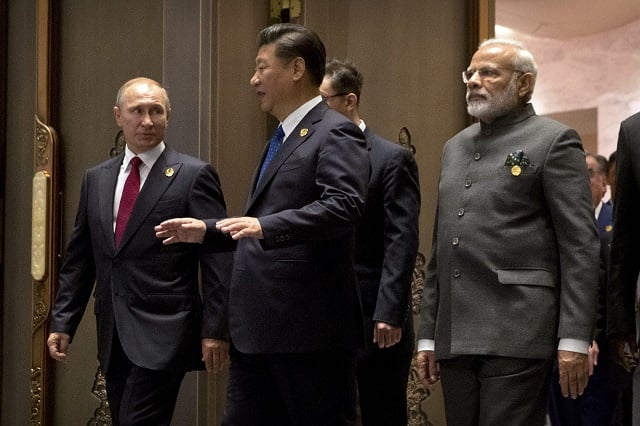
BRICS summit: LeT, JeM 'threat to regional peace'
The exchange, mentioned in a brief dispatch by China's official Xinhua news agency, apparently occurred on the sidelines of the just-concluded summit of BRICS emerging economies hosted by China. It was the second time the leaders had met in three months, but the first since a tense Himalayan border standoff that was the most serious military confrontation between the two countries in decades.
Chinese President Xi told India's Prime Minister Modi on Tuesday that the two countries should respect each other and safeguard peace in border areas, according to the state-owned People's Daily. Xi also told Modi that India should treat China's development correctly and rationally in a meeting on the sidelines of a summit of BRICS countries, according to the People's Daily.
The standoff between Chinese and Indian troop in the Doklam border region ended about a week ago, in time for the BRICS summit of emerging economies, which also includes Brazil, Russia and South Africa.
Hundreds of troops were deployed on the Doklam plateau, near the borders of India, its ally Bhutan, and China after New Delhi objected to China building a road through the mountainous area. The quiet diplomacy that ultimately ended in de-escalation was based on a principle of stopping “differences becoming disputes” that Modi and Xi had agreed in Astana in June at their last meeting.
China has since sought to cast its ties with India in a positive light, saying there was huge potential for cooperation between the giant neighbours. The prospect of the Xi-Modi meeting had raised hopes they will try and repair a relationship that has deteriorated as the two countries find their interests diverge - and often clash - while competing for influence across Asia.
China-India spat signals last hurrah for BRICS
Ties remain strained over the disputed frontier and India is deeply suspicious of China’s growing military activities in and around the Indian Ocean.
For its part, Modi’s government has upset China with its public embrace of Tibetan spiritual leader Dalai Lama, whom the Chinese regard as a dangerous separatist, and growing military ties with the United States and Japan. China has said its forces will continue to patrol in Doklam, which is claimed by Bhutan, and that it hoped India had learned a lesson from the inciden


1732085354-0/insta-(1)1732085354-0-165x106.webp)

1725366721-0/kyle-(1)1725366721-0-165x106.webp)
1732085354-0/insta-(1)1732085354-0-270x192.webp)











COMMENTS (4)
Comments are moderated and generally will be posted if they are on-topic and not abusive.
For more information, please see our Comments FAQ